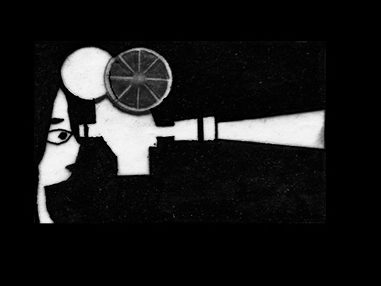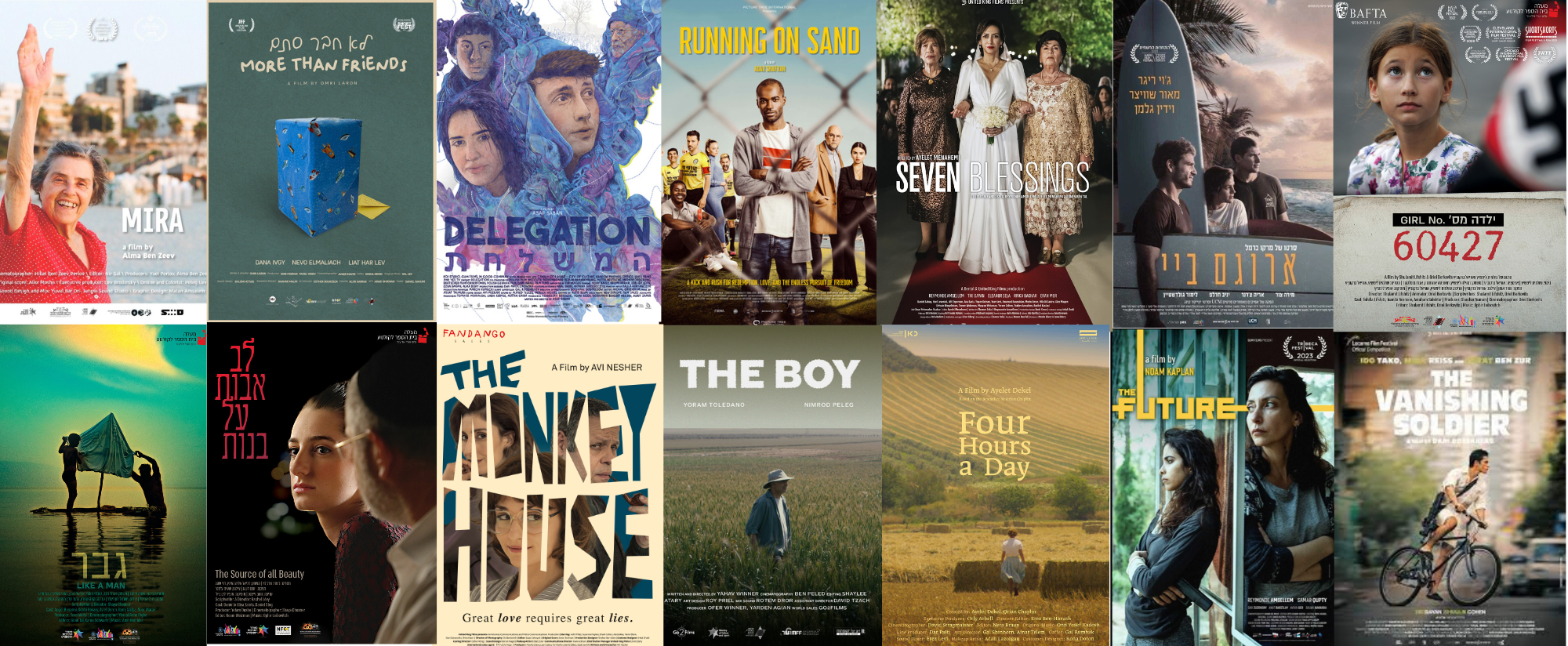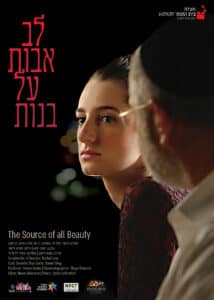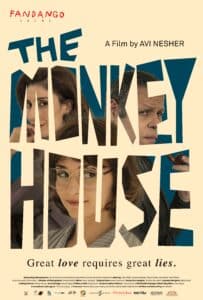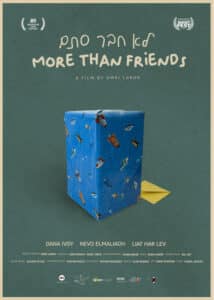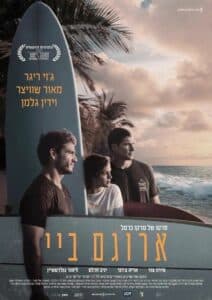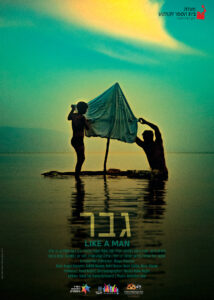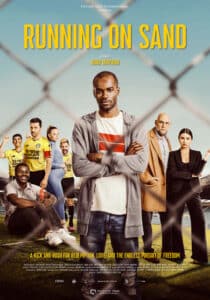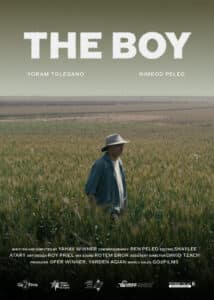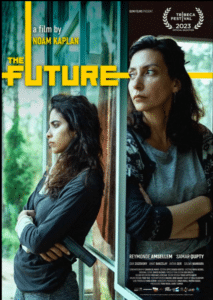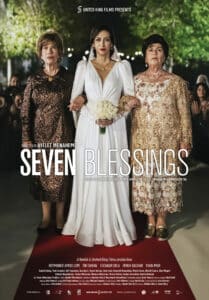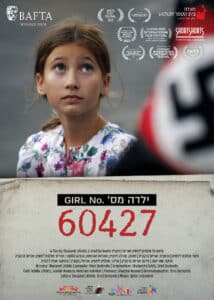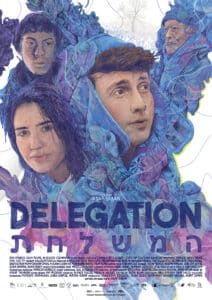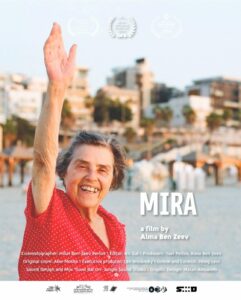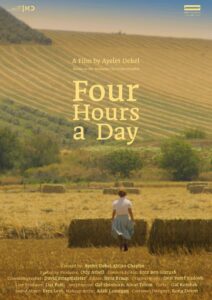Israeli cinema before October 7th
Film Festival in Paris
The Israeli Film Festival in Paris is a must-attend event for cinema lovers in Paris chaired by Hélène Schoumann, surrounded by Armelle Bayou, Production Director, and a team of passionate freeworkers. This year, it was sponsored by Éric Tolédano and Olivier Nakache.
From Tuesday, March 19th to Tuesday, March 26th, the Majestic Passy cinema will host an exceptional selection of feature films, documentaries, and short films from Israel.
Listen to the French podcast about the festival
Armelle Bayou ‘s favorite films
The optimists, alas, were killed in the desert
The Israeli Film Festival in Paris takes place every year around the time of Purim.
It’s an event I never miss since 2017. This year, as the war is not over and the hostages are still not released, I attended with emotion and gratitude, happy that it took place despite everything.
Indeed, despite the unfavorable international context and a call to boycott the festival, the Israeli Film Festival in Paris had full houses for many of its films this year: the opening film, “The Monkey House,” and the closing film, “The Vanishing Soldier” were scheduled in two theaters, and two other films were screened twice in two full theaters: “Matchmaking” and “Seven Blessings”.
Israeli cinema before October 7th
The films selected this year were all shot before October 7th.
To prepare for the 24th edition, Hélène Schoumann and Armelle Bayou had indeed traveled to Haifa the day before the attacks and were able to return to France on one of the last return flights.
For Israeli cinema, nothing will ever be the same. Israeli artists are both artists and soldiers. Some directors, like Yahav Winner, were killed in the pogrom of October 7th, others are now sent to the North, or have returned injured.
We, cinephiles, had the privilege of attending the screenings in the theaters of the Majestic Passy.
So, an extraordinary edition indeed, with moving speeches, marked by the presence of actress Reymonde Amsellem starring in three films this year, “Matchmaking,” “Seven Blessings,” and “The Future,” as well as that of several producers, directors of short and feature-length documentaries and fictions.
Here is a summary of this year’s festival.
Freedom, memory, identity, living together (the kibbutzim), motherhood, and art were the main themes addressed in this year’s films.
ISRAELI SHORT MOVIE
REWARD OF BEST SHORT MOVIE
The source of all beauty directed by Rachel Levy
With: Danny Steg, Danielle Eliya Zaints Yaeli, a young ultra-Orthodox woman, carries a terrible secret that could destroy all her chances of future happiness.
David, a brilliant yeshiva student, seems to want to get to know Yaeli. But her father, in order to protect her from pain and humiliation, refuses to grant permission for a meeting between the two young people.
Undoubtedly one of the most beautiful short films of the festival, which explores the relationships between religion, intimacy, and love.
The director Rachel Levy, present during the screening, wanted to pay tribute to her father, the philosopher and writer Benny Levy.
Best Short Film Award – Jerusalem Jewish Film Festival 2023
Best Actress Award – Jerusalem International Film Festival 2023
ISRAELI FILM FESTIVAL IN PARIS OPENING FILM
The Monkey House directed by Avi Nesher
Synopsis:
The career of Amitai Kriv, a successful Israeli author in the 1960s, declines over time.In the 1980s, he hires a young literature researcher, Margo, to help him regain his place in Israeli literature.
An unexpected encounter between a desperate author and an eccentric young woman that will change their lives.
REVIEW
Avi Nesher is a regular at the Israeli Film Festival in Paris, where he presents a film every year.
“The Monkey House” was presented as the opening film of the festival this year.
Nicknamed “the Israeli Truffaut,” Avi Nesher’s films are always inspired by real events because, as he says, as a former film critic, he has no imagination.
However, his films have often sparked debates and controversies.
Nothing of the sort this year in “The Monkey House,” a reflection on lying and on what can lead us to commit illegal acts to promote our creations.
A true story
Amitai Kriv, a forgotten author, lives in a house near a garden where there are monkeys in cages. He desperately seeks to make a name for himself in modern literature. To do this, the character, played by the great Adir Miller, has come up with a plan.
He decides to produce a thesis on his own work to give it the depth and legitimacy that critics deny him. He thus proposes to a young woman in search of employment, beautiful, intelligent but very far from literature, to pass herself off as his thesis student… She will have to, in a twisted version of Vertigo, cut her hair, dress differently, change her identity. The monkeys near the house then take on a strong symbolic significance.
In the real-life scandal that the film is inspired by, the scandal triggered by his fraud led Amitai Kriv to flee Israel and end his days in Germany.
The film takes a different turn for him.
In “The Monkey House,” women are beautiful and are manipulated for the glory of an unlikable and vain man, an “old-school” theme and an ending that I would have liked to be different.
Present for a Q&A at the screening, Avi Nesher stated that a man lies about 28 times a day.
ISRAELI SHORT MOVIE
More Than Friends directed by Omri Laron
This film explores the challenges faced by an eccentric lesbian mother when she discovers a love letter written by her 11-year-old son to another boy.
A touching look at acceptance and tolerance issues in modern Israeli society.
ISRAELI FEATURE FILM
Arugam Bay directed by Marco Carmel
Synopsis: After their military service, three Israeli surfers travel to Arugam Bay in Sri Lanka to overcome the grief of their friend killed in an operation in Beirut. Their journey leads them through experiences that test their friendship and confront them with their unresolved traumas.
REVIEW
Inspired by his personal life, Marco Carmel directed an initiatory, therapeutic, and escapist film.
The film opens with the war in Lebanon, and this beginning strongly resonates with current events today.
Three young men traumatized by the death of their friend decide to travel to Sri Lanka hoping to regain the taste for life through surfing and resolve their differences.
They also encounter their friend’s lover, Kim, played by Joy Rieger, an actress often seen in films by Avi Nesher. Will they keep the secret of their friend’s death to protect Kim?
According to the Franco-Israeli director, present for a Q&A, it is the entire Israeli population that is constantly in a post-traumatic syndrome.
Beyond the apparent lightness of the film, this feature film also aims to explore more broadly the depth of a societal, national wound, still very taboo.
It is therefore an ode to life, the sea, surfing, and a tribute to this sacrificed youth, sent to the front because there is no other choice.
The film’s cast is also facing difficulties today. Maor Schwitzer is injured and Yadin Geliman has been sent to the front.
A film that is both strong and light (the paradisiacal setting helps), which I particularly liked and which strongly impacted the audience during the screening.
ISRAELI SHORT-MOVIE
Like a man directed by Shaya Chesner
With Angel Bonanni, Sobhi Hosary, Aviel Doron Ronen takes his son Aviv on a Bar-Mitsvah hike to a lake in northern Israel. Ronen’s buried fears resurface abruptly when he encounters three Israeli Arabs who have arrived at the same place for a camping day.
A short film that reveals how quickly a situation can become explosive when racist prejudices and fear of the other resurface.
ISRAELI FEATURE FILM
PUBLIC PRIZE
Running on Sand directed by Adar Shafran
Synopsis :
Aumari, a young Eritrean refugee, accidentally finds himself mistaken for the new striker of the Netanya Maccabi football team.
This film explores themes of identity, fame, and self-discovery.
REVIEW
Adar Safran tells the story of the invisible ones in this film, those who work in restaurants, to whom no attention is paid and who sometimes have no official existence.
Aumari, the main character played by Chancela Mongoza, a refugee who pretends to be a famous soccer player, manages to charm the fans and his teammates, as well as Neta (Kim Or Azulay), the owner’s daughter.
She discovers his true identity but he convinces her to keep his secret. “How can you always be so optimistic?” she asks him. “The pessimists died in the desert,” he replies.
With humor and tenderness, the director denounces the racism faced by Black people in Israel. The refugees are portrayed by real refugees, and at the end of the film, one hesitates between laughter and tears.
It must have certainly appealed to Éric Tolédano, who was present in the audience during the screening, as Running on Sand bears a strong resemblance to the films of the directorial couple he forms with Olivier Nakache.
This film also has a touch of “Ted Lasso” (a series about football set in England).
WHEN REALITY MEETS FICTION
The film enthralled the audience in a packed hall, followed by a discussion with the director Adar Shafran, for whom this is his first film (he is usually a producer).
When fiction meets reality, unfortunately, it’s far less amusing.
Chancela Mongoza, the lead actor – fabulous, recognized by everyone on the streets of Israel today, still has no official papers and couldn’t travel to France for the screening of the film in which he plays the lead role.
A film that was supposed to be released last October, released in theaters in December in Israel and screened for survivors of the massacres of October 7.
Unfortunately, the optimists died in the desert.
ISRAELI SHORT-MOVIE
The Boy, directed by Yahav Winner
A filmmaker from Kfar Aza murdered
Avinoam and Barak, father and son from a kibbutz located on the Gaza border, are forced to confront a new series of rockets and combat, each in their own way.
Yahav Winner, whose child and wife survived the pogrom, leaves behind an impressive number of films.
On Saturday, October 7th, in the early morning, Hamas terrorists burst into Yahav’s family room in Kfar Aza kibbutz, in southern Israel.
Yahav tried with all his might to block the terrorists, allowing his wife, Shaylee, and their one-month-old daughter, Shaya, to escape. Shortly after, Yahav was cold-bloodedly murdered. Shaylee and Shaya were rescued after 27 hours.
The film, as Yahav Winner explained at the time, was supposed to “address the trauma of Israel’s residents as well as the constant conflict that exists within you when you look beyond the fence at what’s happening in Gaza.” He added, “This bloody conflict is traumatizing because it has no solution, but within all of this, there is comfort brought by personal connections.
You can watch it in its entirety here.
ISRAELI FEATURE FILM
The Future directed by Noam Kaplan
Synopsis :
Dr. Bloch, eager to have a child, embarks on a quest to find a surrogate mother.
Meanwhile, his algorithm to prevent terrorist attacks fails, leading him to confront a young Palestinian woman responsible for an attack.
Between counseling sessions and exchanges with the potential surrogate mother, Dr. Bloch questions his choices and his past.
REVIEW
Without a doubt, the most unconventional film of the festival.
Actress Reymonde Amsellem was present during the screening to discuss her role as Dr. Bloch, an engineer who has developed an algorithm intended to prevent terrorist attacks and who must interrogate the young woman played by Palestinian actress Samar Qupty.
This dystopian film, shot like a theater piece and strongly connected to current events, advocates for dialogue.
A future in which motherhood plays an important role because more often than not, sons are destined for the army.
And an engrossing film in which women occupy a prominent place, whether they are mothers, prospective mothers, becoming mothers, or not.
As the gynecologist rightly tells Dr. Bloch, it is men who start wars, and it is the same men who receive Nobel Peace Prizes for ending them.
ISRAELI FEATURE FILM
Seven Blessings directed by Ayelet Menahemi
Synopsis : Marie leaves France for Israel to marry her true love.
But during the festivities preceding her wedding, family secrets resurface, shedding light on old tensions and wounds.
REVIEW
This film could have been conceived as a documentary.
The story of “Seven Blessings” draws its roots from a terrible Moroccan custom, from another time, which shattered thousands of lives.
When a woman had several children and her sister could not have any, she would give her one. The child then became a sort of commodity exchanged based on the financial fluctuations of the families.
Reymonde Amsallem and her first cousin, Elinor Sela, who co-wrote the screenplay, wanted to tell this story.
The film begins with a wedding.
The heroine, Marie, played by Reymonde Amsellem, decided to reconnect with her family during her wedding and not to mention the past.
Despite her intentions, it resurfaces.
The “seven blessings” are these ritual meals organized for a week after a wedding. Seven family gatherings that give rise to as many dramas, settling of scores, before revealing a cruel truth.
The director masters the art of framing and pacing these family gatherings where the dialogues resonate like gunfire.
Each line is delivered by brilliant and committed actresses.
Ayelet Menahemi pays tribute to these women (only girls were given away) at the end of the film by showing them on screen in the closing credits.
This challenging and necessary film has enjoyed phenomenal success in Israel, where it won 10 Ophirs out of 12 nominations (the equivalent of the César Awards in France).
ISRAELI SHORT-MOVIE
Girl No.60427. Directed by Oriel Berkovits & Shulamit Lifshitz
Tel Aviv 1998. A young girl discovers her grandmother’s secret diary recounting her life in concentration camps. “Girl No.60427” offers a poignant reflection on family memory and the legacy of the Holocaust.
BAFTA in the category “Student Films” 2022. Inspired by her true story and the relationship Shulamit Lifshitz had with her Holocaust-survivor grandmother.
An extraordinary story that deserves to be developed into a feature film.
ISRAELI FEATURE FILM
Delegation directed by Asaf Saban
Synopsis : A group of Israeli high school students go on a school trip to Poland to discover the concentration camps.
This journey confronts the youth with the complex history of World War II and helps them understand their identity as Israelis.
REVIEW
Frisch (Yoav Bavly), Nitzan (Neomi Harari), and Ido (Leib Lev Levin) – embark on a trip to Poland with their classmates, their teacher, and Frisch’s grandfather, Josef (Ezra Dagan), who is a Holocaust survivor, to visit memorial sites and monuments commemorating the Holocaust.
Their trio is solidary. But things get complicated as Nitzan is in love with Ido, who is already with someone else, and Frisch has feelings for Nitzan.
Amidst forays into death, cold, and the past, and with Holocaust films screened on the bus such as “Fiddler on the Roof,” “Escape from Sobibor,” or “Schindler’s List,” the youth search, are shaken, and transformed.
The directives from their guide, encouraging them to reflect on the feelings of those aware of their fatal destiny at the end of the road, or the accounts of their journey while confined in a train carriage, are harrowing moments. However, each evening, a group discussion allows them to share their daily experiences.
In this coming-of-age film, the director adds some touches of lightness through the exchanges among high school students, at the dawn of their lives.
This debut film raises many questions about our relationship with transmission. Do we have an emotional limit to its reception?
And if so, what is it?
The film was presented in the Generation 14 plus section of the Berlinale 2023. It won the Best Screenplay and Best Ensemble awards at the Jerusalem International Film Festival.
A Dive into Israeli History and Societys
ISRAELI SHORT-MOVIE
Mira, directed by Alma Been Zeev
“Mira” is the intimate portrait of 90-year-old Mira Perlov, widow of the famous Israeli documentarian, David Perlov.
Through the eyes of her granddaughter, Alma, the film explores this deep relationship tainted by Mira’s Alzheimer’s, capturing the poignant deterioration of their bond.
Student Pitch Award – Docaviv 2022
A beautiful tribute to a beloved, brilliant grandmother who will remain in the shadow of her husband like many women of her generation.
ISRAELI FEATURE FILM
Four Hours a Day directed by Ayelet Dekel
The film unveils a poignant and still little-known story of young mothers in the kibbutz movement in Israel.
Based on the bestselling book by Orian Chaplin, this documentary explores the emotional scars left by a practice where babies were taken from their mothers to live in a collective children’s house.
A moving narrative that questions the long-term consequences of these choices on mothers and their children.
REVIEW
This documentary revisits the history of Israel, a country founded on the principle of kibbutzim, the Israeli adaptation of the sovkhoz and kolkhoz systems.
Ayelet Dekel interviewed several women who lived in the kibbutzim when they were the norm.
The men behind this system had decided how much time mothers could spend with their children: four hours a day. Three days after giving birth, babies were entrusted to the Children’s House, where they were raised communally until adolescence.
The lack of physical contact between mother and child from birth, the restless nights for both, the children knocking on the door in the middle of the night hoping their mother would open it… A traumatic system accepted by some and contested by many women over generations.
As with other issues related to women, such as abortion, men decided on maternal needs in the name of the “Good” of the nation, without questioning this system that crushed the individual.
Kibbutzim evolved, and in 1986, some began allowing families to keep their children with them.
In 1991, this educational system disappeared. Many kibbutzim were also converted into moshavim, cooperatives recognizing land ownership, in order to survive within the Israeli social-liberal turn.
The few kibbutzim that remained adapted to modernity and retained an ideal of collective living and communalism.
After the pogrom of October 7, what will it be like in the months and years to come?
ISRAELI FILM FESTIVAL IN PARIS CLOSING FILM
The Vanishing Soldier directed by Dani Rosenberg
With Ido Tako, Mika Reiss, Efrat Ben Zur, Tiki Dayan, Shmulik Cohen
Shlomi, an eighteen-year-old Israeli soldier, flees the battlefield of Gaza to join his girlfriend in Tel Aviv.
He then discovers that the Israeli army’s elite believes he has been kidnapped in the fog of war.
A tragicomic 24-hour journey through the hot and humid streets of Tel Aviv, shifting from terror to hope, romance to nightmare.
REVIEW
In his previous film, “The Death of Cinema and My Father Too,” Dani Rosenberg took us on a fictional journey centered around his father, who was suffering from cancer and terrified by the possibility of Israel being bombed by Iran. It depicted a father who decides to take his entire family in a car to flee these potential attacks.
This time, in “The Vanishing Soldier”, it’s again about escape, but this time of a young soldier.
Sent on a military operation in Gaza, the soldier decides to return home to find the young woman he loves, who is soon leaving for Canada. She asks, “Why stay here?”
Against the backdrop of rockets raining down on Tel Aviv, Schlomi runs, climbs, runs again, and hides.
Schlomi is full of life, hungry for love, hungry all the time, and doesn’t want to fight. Between his grandmother, mother, and father, he ultimately has no escape except the army. But his desertion triggers a national investigation and retaliation on Gaza…
FILMED BEFORE OCTOBER 7
The lead actor, Ido Tako, is sensational, and one can almost physically feel his energy on the screen. He constantly oscillates between laughter and total collapse, and his immense love in contrast to the brevity of his encounter with Shiri (played by Mika Reiss) reflects his fear of death.
Efrat Ben Zur, playing his panicked mother (she also starred in Nir Bergman’s “The Kid” shown last year), and Tikva Dayan as the grandmother, also featured in “Seven Blessings,” the film with ten Ophir Awards (see earlier review).
Filmed before October 7, Dani Rosenberg creates an almost prophetic film about the impending war and about this youth who cannot refuse the army, who has no choice.
A youth, like the heroes of “Arugam Bay” (see earlier review), deprived of freedom, and who sometimes finds it elsewhere: abroad, in parties, in complicated love stories, or in drugs.
Sadly relevant, the film is released in theaters on April 24, distributed by Cinémas Dulac.
Go for it!
INTERVIEW WITH THE LEAD ACTOR IDO TAKO
TRAILER
